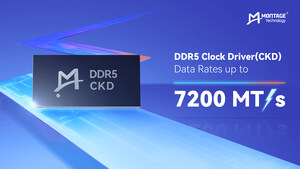Montage Technology Introduces 4th-Gen DDR5 RCDs Enabling Data Rates up to 7200 MT/s
SHANGHAI, Jan. 5, 2024 /PRNewswire/ -- Montage Technology, a leading data processing and interconnect IC company, today introduced its 4th-gen DDR5 Registering Clock Driver (RCD), also called DDR5 RCD04, to the industry. Designed for DDR5 RDIMM memory modules, this chip supports blazing-fast data rates up to 7200 MT/s, a 50% increase over the 1st-gen DDR5 RCDs.
As a leader in memory interface technologies, Montage has led the development of JEDEC standards for DDR5 RCD chips and sustains high R&D investments to enable continuous product iterations and upgrades. Since debuting its 1st-gen DDR5 memory interface and memory module supporting chips in 2021, the company successfully released the second and third generation DDR5 RCD chips in 2022 and 2023 respectively.
Now, Montage has achieved yet another breakthrough with its 4th-gen DDR5 RCDs, further strengthening its leadership in memory interface chips. Montage is now delivering these cutting-edge DDR5 RCD04 engineering samples to leading memory manufacturers, empowering the development of next-generation DDR5 memory modules.
"The RCD chip sits at the heart of the memory module, serving as the vital channel for data exchange between the CPU and memory," said Mr. Stephen Tai, President at Montage Technology. "With rising AI and machine learning demands, ever-greater computing power of CPU requires matching memory performance. Montage's latest DDR5 RCD04 unlocks higher memory bandwidth to remove bottlenecks for today's most demanding workloads."
Alongside its RCD portfolio, Montage provides DDR5 Data Buffers (DB) and other essential DDR5 module supporting chips like SPD EEPROM with Hubs, Temperature Sensors, and Power Management ICs. Together with the RCD chips, these components deliver indispensable capabilities for DDR5 memory modules.
To learn more about Montage's memory interface products, please click https://www.montage-tech.com/Memory_Interface.
SOURCE Montage Technology






Share this article